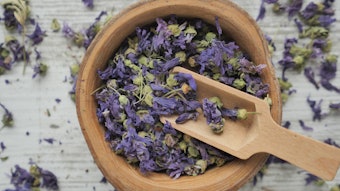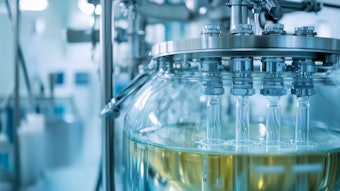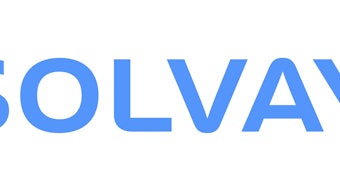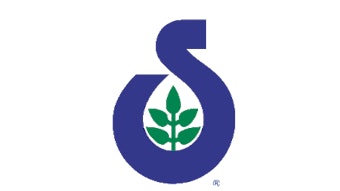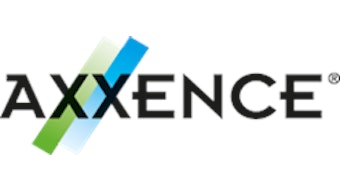Senomyx’s second-quarter revenue fell to $7.3 million from $7.7 million a year earlier and its net loss remained unchanged. Also during the quarter, the company received Flavor and Extract Manufacturers Association (FEMA) generally recognized as safe (GRAS) regulatory determination for new cooling agent, S2227, and was granted Joint FAO/WHO Expert Committee on Food Additives (JECFA) regulatory approval for Sweetmyx, which is a flavor with modifying properties used as part of a flavor system to restore the desired taste profile of products in which sweeteners have been reduced.
Read the earnings release below, or click here.
SAN DIEGO, July 31, 2014 /PRNewswire/ -- Senomyx , Inc. , a leading company using proprietary taste science technologies to discover, develop, and commercialize novel flavor ingredients for the food, beverage, and ingredient supply industries, today reported financial results for the second quarter 2014. The Company ended the second quarter with $33.6 million in cash and highly liquid investments.
"During the past quarter Senomyx achieved another important milestone with the regulatory approval of a new flavor ingredient," said John Poyhonen, President and Chief Executive Officer of the Company. "We were very pleased to receive notification from the Expert Panel of the Flavor and Extract Manufacturers Association of the United States (FEMA) that S2227, a novel cooling agent, has been designated Generally Recognized As Safe (GRAS). This approval opens new commercial opportunities for Senomyx and marks the fourth taste modality – sweet, savory, bitter, and now cooling - for which the Company has completed the discovery, development and regulatory process."
The FEMA GRAS determination allows Senomyx's partner for the Cooling Taste Program, Firmenich, to pursue commercialization of S2227 in the U.S. and a number of other countries. The FEMA GRAS status also assists with approvals in other regions of the world. S2227 has demonstrated preferred cooling properties and advantages over currently available agents such as menthol, including greater potency, longer cooling duration, and a lack of undesirable aroma for certain applications. The FEMA GRAS designation permits usage in a variety of product categories including confectionaries, sauces, beverages, and dairy products.
"In other regulatory news, Senomyx's Sweetmyx ® SR96 (S9632) has received a positive determination regarding safety from the Joint FAO/WHO Expert Committee on Food Additives (JECFA). SR96, which is currently being commercialized by Senomyx and our partner Firmenich, previously received a FEMA GRAS designation for use in virtually all food and beverage product categories. The JECFA determination allows usage of SR96 in many new international markets," Poyhonen noted.
JECFA is an independent committee of international scientific experts that has been evaluating the safety of food additives and flavors since 1956. It is jointly administered by the Food and Agricultural Organization (FAO) and World Health Organization (WHO) of the United Nations. JECFA performs safety assessments and provides advice to FAO, WHO, and the member countries of both organizations. A JECFA determination allows immediate usage in many countries, unless product registration is required at the country level.
The Company also announced today that it has received a Notice of Allowance from the U.S. Patent and Trademark Office for a new patent entitled, "Sweet Flavor Modifier", which includes composition-of-matter claims for Sweetmyx S617 and will be in force through December 4, 2033. In addition to Sweetmyx S617, the patent covers a number of similar flavor modifiers for sucrose, fructose, and sucralose.
"Senomyx continues to make a significant investment in our intellectual property portfolio and we are very pleased to receive notice of an issued patent on one of our most important assets," said Poyhonen. "We believe that we are still on track for the first commercialization of SweetmyxS617 by a partner before the end of 2014. "Also during the second quarter, Senomyx announced that PepsiCo exercised its option to extend the companies' collaborative agreement related to Senomyx's sweet-taste technology for an additional two years, through August 2016," Poyhonen stated. "This extension, combined with the previously announced PepsiCo research agreement for our Salt Taste Program, provides us with important sources of research funding."
Commercialization Updates:
Senomyx Direct Sales Program: Senomyx intends to leverage its proprietary taste science technologies to become a leading commercial provider of novel flavor ingredients to the flavor industry. The Company's Complimyx® Taste Modulation Ingredients brand includes Senomyx's Sweetmyx sweet flavor modifiers, Savorymyx® savory flavors, and Bittermyx® bitter blockers. Sweetmyx ingredients are sweet flavor modifiers used with other flavors to restore the desired sweet taste of products in which sucrose or other sweeteners have been reduced. Having multiple Sweetmyx offerings allows the Company to address specific food or beverage product requirements and broadens the potential applications for Senomyx's flavor ingredient portfolio.
Sweetmyx SR96 (S9632), a flavor with modifying properties used to restore the desired sweet taste in sucrose-reduced products, is currently being evaluated by flavor companies for end-use in non-alcoholic beverages. Commercial-scale quantities of SR96 have been received from the contract manufacturer. Senomyx has begun commercialization activities with a similar flavor ingredient, Sweetmyx SR69 (S6973), with a focus on usage for food product categories. Regulatory approvals for SR69 allow commercialization in virtually all countries targeted for marketing. The Company received initial commercial-scale quantities of SR69 during the second quarter of 2014.
Savorymyx flavors provide a distinct new savory (umami) taste sensation and can be combined with other ingredients to create unique new flavor blends. They are applicable for a variety of products including sauces, frozen foods, cooking aids, soups, and snack foods, and can be used to reduce or replace added monosodium glutamate (MSG). Savorymyx UM80 (S807) is being evaluated by flavor companies in the U.S. and elsewhere for use in numerous food and beverage product categories.
Senomyx has received commercial-scale quantities of UM80 from a global manufacturer to support the Company's marketing efforts. Bittermyx bitter blockers are used to reduce the bitterness of ingredients that impart a bitter taste or have a bitter lingering effect such as soy and whey proteins, menthol, caffeine, cocoa, and Rebaudioside A (stevia). Senomyx has initiated evaluations of Bittermyx BB68 (S6821) with flavor companies for multiple potential usages. The Company expects that commercial-scale quantities of BB68 will become available during the third quarter of 2014.
Royalty-Based Collaborations: Senomyx has collaborative agreements with several of the world's leading packaged food, beverage, and ingredient companies. The Company has received commercial revenues on sales of products incorporating its flavor ingredients from Firmenich SA, Nestlé SA, and Ajinomoto Co., Inc.
• S2383, a sucralose modifier, is being used primarily in beverage products marketed in North America, Latin America, Asia, and Europe.
• S6973 is being used in a variety of product categories including ready-to-drink and powdered beverages, dairy products, and baked goods in the Americas, Southeast Asia, Africa, and Australia.
• S9632 is being evaluated for use in foods, alcoholic beverages, and powdered beverages.
• S336, a savory flavor, is being used in new and reformulated established products that were launched into the retail, industrial, and food service channels in selected countries within Africa, Asia, Latin America, and the Middle East.
• S6821, a bitter blocker, is currently being used in several products in a country in Southeast Asia. Upcoming Commercialization: Senomyx's newest Sweetmyx ingredient (S617) is a flavor with modifying properties that is used as part of a flavor system to maintain the taste in a wide variety of foods and beverages in which a sweetener has been reduced.
PepsiCo has exclusive rights to use the new flavor ingredient worldwide in non-alcoholic beverages and Firmenich has rights to commercialize it for food product categories and alcoholic beverages, with exclusive rights until March 2018.
Discovery & Development Program Updates:
Sweet Taste Program : The primary goal of Senomyx's Sweet Taste Program is to add to the Company's portfolio of new flavor ingredients that restore the desired flavor profile to food and beverage products that have a significant reduction in sweeteners. Senomyx is continuing efforts to discover novel flavors with modifying properties that could create incremental value. The Company has identified new flavor modifiers of sucrose and fructose that possess advantageous properties and may help expand the potential market for Senomyx's sweet flavor modifiers portfolio.
Evaluations and prioritization of new sweet flavor modifiers that are candidates for development activities are ongoing. The goal of the Natural Products component of Senomyx's Sweet Taste Program is to discover and develop novel no- or low-calorie natural high intensity sweeteners and natural sweet flavor modifiers. The Company has identified several natural products from plant sources that function as flavors with modifying properties and natural high intensity sweeteners. Continuing activities include further expansion of Senomyx's natural products library, high-throughput screening of these plant-derived samples, and additional taste tests of samples of interest.
Cooling Taste Program: The goal of the Cooling Taste Program is to identify novel cooling agents that have advantages over currently available agents such as menthol. The Expert Panel of the Flavor and Extract Manufacturers Association of the United States has granted a "Generally Recognized As Safe" determination for S2227, a novel cooling agent. The FEMA GRAS designation allows usage of S2227 in numerous product categories including confectioneries, sauces, beverages, and dairy products. Firmenich has exclusive commercialization rights for S2227. Senomyx is evaluating additional new cooling agents for potential future commercialization.
Salt Taste Program: The goal of Senomyx's Salt Taste Program is to identify flavor ingredients that allow a significant reduction of sodium in foods and beverages yet maintain the salty taste desirable to consumers. This program is an important focus for the Company's research activities. Senomyx has been using analytical approaches to evaluate a large proprietary database of proteins found in taste buds in order to find the specific protein or group of proteins that function to detect salt in foods. This protein or proteins can then serve as research targets to discover new salt flavor modifiers using Senomyx's novel flavor technology. Senomyx has identified a small group of proteins that meet certain criteria for potentially being involved in salt taste, and more advanced tests are underway to determine if they function to detect salt. Each of these candidate targets is being further evaluated to see if it modulates salty taste, which would provide a taste proof-of-concept. In April, the Company announced that it had entered into a new research agreement under which PepsiCo will provide research funding for the Salt Taste Program for 2014 and has options to extend the research funding period. PepsiCo will have non-exclusive rights to salt flavor modifiers discovered during the research funding period. In addition, Senomyx will have the right to supply these flavor ingredients directly to PepsiCo.
Intellectual Property: Senomyx continues to be diligent in seeking protection for its intellectual property. As of June 30, 2014, the Company is the owner or exclusive licensee of 438 issued patents and several hundred pending patent applications in the U.S., Europe, and elsewhere related to proprietary taste science technologies.
Financial Review: At June 30, 2014, Senomyx held $33.6 million in cash, cash equivalents and investments available-for-sale. Total revenues were $7.3 million for the second quarter ended June 30, 2014 and $7.7 million for the second quarter ended June 30, 2013. Total revenues for the six months ended June 30, 2014 were $15.5 million compared to $15.1 million for the six months ended June 30, 2013. Development revenues were $5.9 million for the second quarter of 2014 and $6.2 million for the second quarter of 2013. The decrease was primarily attributable to a change in the service period over which the upfront license fee related to the PepsiCo Sweet Taste Program collaboration is being recognized in accordance with PepsiCo's election in May 2014 to extend the service period of the collaboration an additional two years to August 2016. There was no impact on cash flow since the $30 million upfront license payment was received in 2010. This decrease was partially offset by a $500,000 increase in development milestone revenues related to the Cooling Taste Program.
Development revenues for the six months ended June 30, 2014 were $12.7 million compared to $12.2 million for the six months ended June 30, 2013. The increase primarily resulted from $1.8 million of development milestones earned in 2014, partially offset by a decrease in revenues from development cost reimbursements and a decrease in revenues related to the Cooling Taste Program, as research funding under the Company's collaboration with Firmenich expired in June 2013. Commercial revenues were $1.4 million for the second quarter of 2014 and $1.5 million for the second quarter of 2013. Commercial revenues were $2.9 million for each of the six months ended June 30, 2014 and 2013. These results reflect non-recurring revenues in the second quarter of 2013 related to a Savory Taste Program collaboration, as well as direct sales and increases in other commercial revenues from the Savory and the Sweet Taste Programs in the first half of 2014.
Research, development and patents expenses, including stock-based compensation expenses, decreased to $6.6 million for the second quarter of 2014 from $7.0 million in the second quarter of 2013. For the six month periods ended June 30, research, development and patents expenses decreased to $13.6 million in 2014 from $14.3 million in 2013. The primary factor for the decreases from 2013 to 2014 was reduced outside services costs for safety studies to support regulatory filings. Selling, general and administrative expenses, including stock-based compensation expenses, were $3.3 million for the second quarter of 2014 and $2.9 million for the second quarter of 2013. Selling, general and administrative expenses for the six months ended June 30, 2014 were $6.4 million compared to $6.0 million for the six months ended June 30, 2013. The increases from 2013 to 2014 were primarily due to increased non-cash stock-based compensation expenses in 2014 resulting from a higher fair value for stock options granted in 2014 based on the higher price of Senomyx's common stock.
The net loss for each of the quarters ended June 30, 2014 and 2013 was $0.06 per share. The net loss for the six months ended June 30, 2014 was $0.11 per share compared to $0.13 per share for the six months ended June 30, 2013. Financial Outlook: "Financial results for the first half of 2014 were consistent with management expectations and we are reiterating our financial guidance," stated Tony Rogers, Senior Vice President and Chief Financial Officer.
For the full year 2014, Senomyx continues to expect:
• Total revenues of $32 million to $35 million, of which approximately $10 million are commercial revenues
• Total operating expenses of $44 million to $46 million, of which approximately $6 million are non-cash, stock-based compensation expenses
• Net loss of $10 million to $12 million
• Basic and diluted net loss of $0.23 to $0.28 per share
• Year-end cash, cash equivalents and investments available for sale balance greater than $25 million.
"During the second quarter we continued to make progress with our direct sales initiative, highlighted by our first meaningful sales order of a product to be commercialized by a flavor company. We continue to expect that growth in commercial revenues over the next several years will be primarily driven by direct sales and the Sweet Taste Program collaboration with PepsiCo. With $34 million in cash and no debt, as well as $29 million in committed development payments and $28 million in potential milestone payments under current collaborations, Senomyx remains well-positioned to achieve our discovery, development and commercialization objectives including our goal of approximately $25 million in commercial revenues in 2015. Furthermore, we do not have plans to raise money through the issuance of equity or debt to fund the current scope of our operations and we remain on track to achieve profitability in 2015," Rogers concluded.

